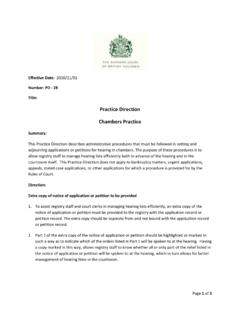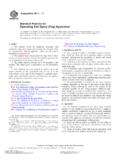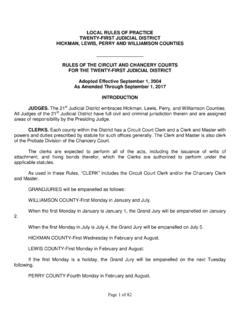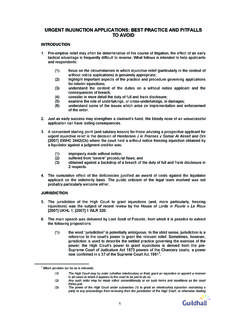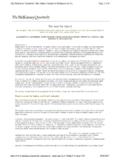Transcription of Domestic Violence: Contact Disputes and Fact …
1 Domestic violence : Contact Disputes and Fact Finding Hearings Introduction by Khatun Sapnara The Law in relation to Fact-Finding Hearings'. Jeremy A Brown, Coram Chambers Picking up the pieces: Domestic violence and child Contact '. Presented by Ruth Tweedale, Rights of Women Practical guidance on dealing with allegations made within Contact Disputes '. Lucinda Wicks, Coram Chambers Domestic violence , Child Contact , Post-Separation violence Experiences of South Asian and African-Caribbean Women and Children'. Presented by Khatun Sapnara, Coram Chambers The law in relation to Fact-Finding Hearings Jeremy A. Brown February 2013. 1. Introduction The adversarial nature of fact-finding hearings and their significance The fact-finding hearing ( FFH') is commonly considered by lay clients as the most stressful stage in private children law proceedings.
2 Where Domestic violence ( DV') has been pleaded by an alleged victim, it is often the case that in considering whether Contact poses a risk to the child or the victim- past ordeals have to be painfully dredged to the surface and put under scrutiny. For the alleged victim, this inevitably will involve reliving horrific events in their relationship with the alleged perpetrator and then having their account challenged in cross examination. On the other hand, an alleged perpetrator will often feel frustrated by exaggerated' or made up claims' that only exist to prevent them from having a meaningful relationship with their child/ren; and, furthermore, a feeling that their character is being unfairly prejudiced should they emotively express their frustrations in court.
3 Not only does a lay client have to face up to the- often horrifying- reality of giving oral evidence, they also have to digest the difficult advice that FFHs are rarely simple affairs and that the judge's decision at the end of the hearing will inevitably colour how the rest of the case proceeds (however, see the discussion below at 3). Indeed, once the decision has been made that a FFH is necessary (whether as part of a split hearing or a full' final hearing, see below) the self- confessed inquisitorial nature of private children law proceedings takes on a distinctly adversarial Accordingly, so much is at stake for each of the parties, as the judge, the finder of fact, will have to decide upon two competing positions with little or no room to compromise.
4 Moreover, the adversarial nature of FFHs brings with it a heightened sense of litigation risk, especially as any decision is crystallised in the form of a judgment that will often be heavily relied upon by any experts involved with the case. Often, with two irreconcilable positions, a finding either way will lead to the aggrieved lay client feeling as if they were not believed and that whatever flows from the judgment thereafter is unjust and not in the child/ren's best interests. Perhaps it is ironic that the stress of giving oral evidence is very seldom experienced by solicitors and barristers. However, given the adversarial nature of FFHs, it is absolutely essential that lay clients are given the right advice to assist them in evaluating whether they wish to pursue a FFH or resist such a direction being made, and, to ensure that a FFH (or the potentiality of a FFH) is approached in the best way possible with diligent attention to the evidence.
5 It is important that this advice is given to lay clients at an early stage and reiterated as new evidence comes in prior to any direction for a FFH being made. Unlike under the Civil Procedure Rules, which place an emphasis on investigation and disclosure prior to issuing a claim, evidence in the family law jurisdiction will often be adduced in a piecemeal fashion and in relation to the live issues at the time. Accordingly, it is often difficult for lay clients, especially in a jurisdiction which relies heavily on documentary evidence, to comprehend and weigh up all the issues, if they are being advised at court for the first time as to whether they should support or oppose the listing of a FFH.
6 1. Indeed, it appears that despite a push towards greater inquisitoriality' this will continue to be the case, and will arguably be reinforced, following the implementation of reforms advocated by Ryder J as part of the Family Justice Modernisation Programme. Ryder J, speaking on 26 June 2012 in relation to the creation of a Unified Family Court and the Family Justice Modernisation Programme, recently stated: In addition we hope to publish a statement of inquisitorial principle. We aim to demonstrate and assist everyone to understand that save in relation to adversarial fact finding sufficient to make the ultimate decision before the court, the judge's function is inquisitorial.
7 (With thanks to David Boyd for providing the source, which can be found at ). Accordingly, a flexible working relationship between counsel and solicitor is likely to be of great assistance in evaluating the evidence and issues as they develop from the First Hearing Dispute Resolution Appointment onwards. What this section of the seminar will cover This section of the seminar considers the law in relation to FFHs where DV is a central element in respect of an application for Contact or residence. It aims to assist legal advisers in formulating their advice to lay clients as to how an application for Contact /residence might progress.
8 In doing so, two key issues are addressed in relation to FFHs and private children law Disputes : When is a FFH appropriate? The law in respect of facts found or not found. Defining a FFH / Split hearings It may seem a bit redundant to define what is meant by a FFH, however to ensure we are all singing from the same hymn sheet I will start by defining the terminology. The President's Guidance in Relation to Split Hearings May 2010 [2010] 2 FLR 1897 ( PG') defines a fact-finding hearing' as the first limb of a split hearing; a split hearing' being: [A] hearing divided into two parts, during the first of which the court makes findings of fact on issues identified by the parties or the court, and during the second part of which the court, based on the findings which it has made decides the case.
9 Where the PG refers to a FFH it is really referring to the preliminary limb of a split final hearing. In this seminar note, a FFH is a hearing is defined more generally to include any hearing where a judge is asked to make findings of fact in respect of the alleged past behaviour of a party, whether this fact-finding function comprises the first limb of a split hearing or part of a comprehensive (or more properly referred to as a substantive') final hearing. In directing how a case should progress, consideration should be given as to whether findings of fact will assist the judge (see below at 2) and, where a split hearing is not directed, it should be spelt out on the face of an order so it is clear whether the Court intends to try matters of fact at a final hearing or proceed on the basis of welfare considerations only.
10 It is vital that the legal representatives of both parties to clarify the issues for a final hearing and narrow them where possible. If such an approach is followed, then preparation for the final hearing can be much more focussed. In respect of splitting the hearings, the PG states that in the President's judgment it will be a rare case in which a separate fact-finding hearing is necessary (at paragraph [7]). Importantly, allegations of DV are not a reason in themselves to split' a hearing (see paragraph [8]). Strangely, despite numerous references, the PG does not give any guidance in respect of the appropriate circumstances to split' a hearing in a private children law dispute.
